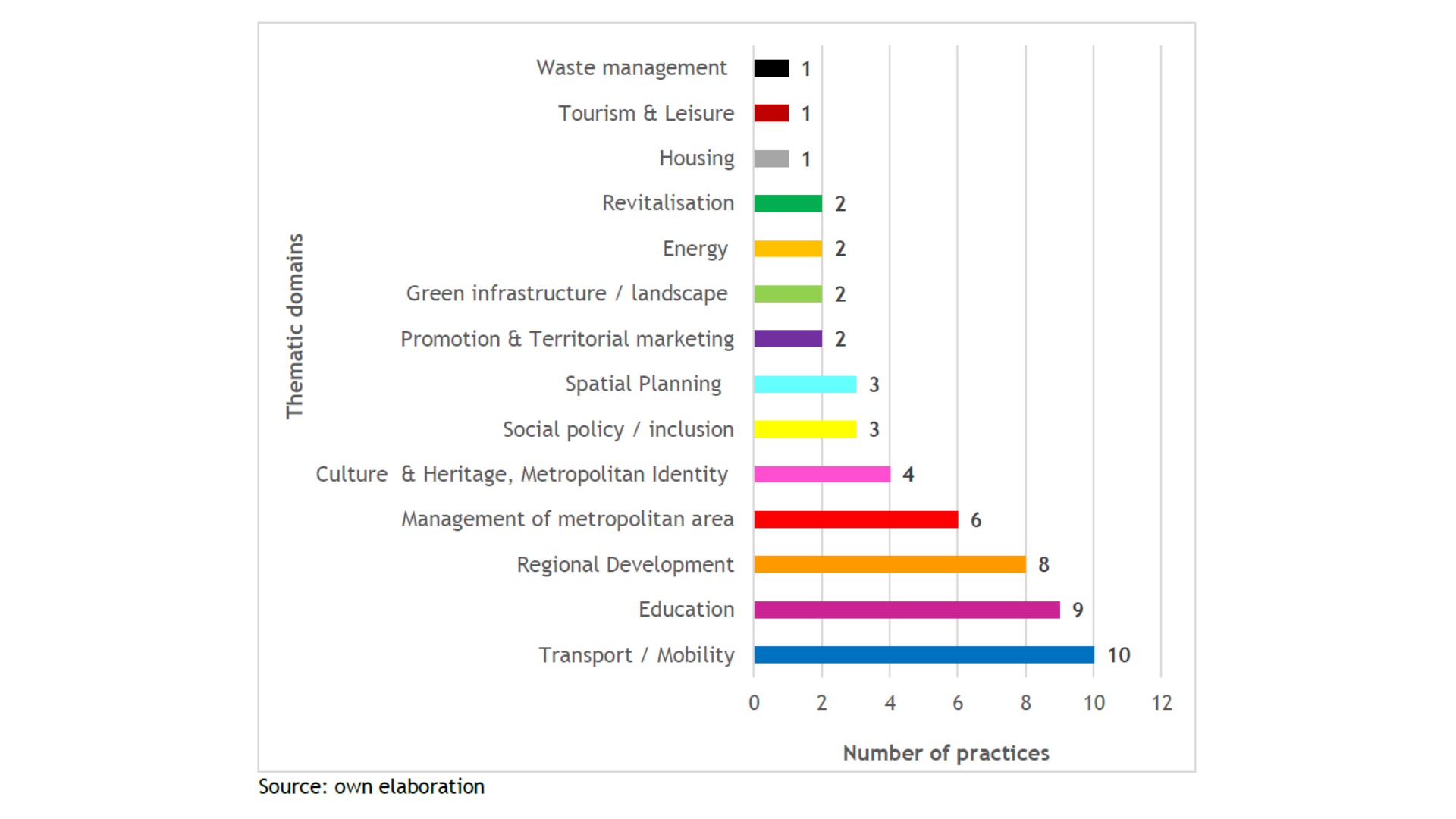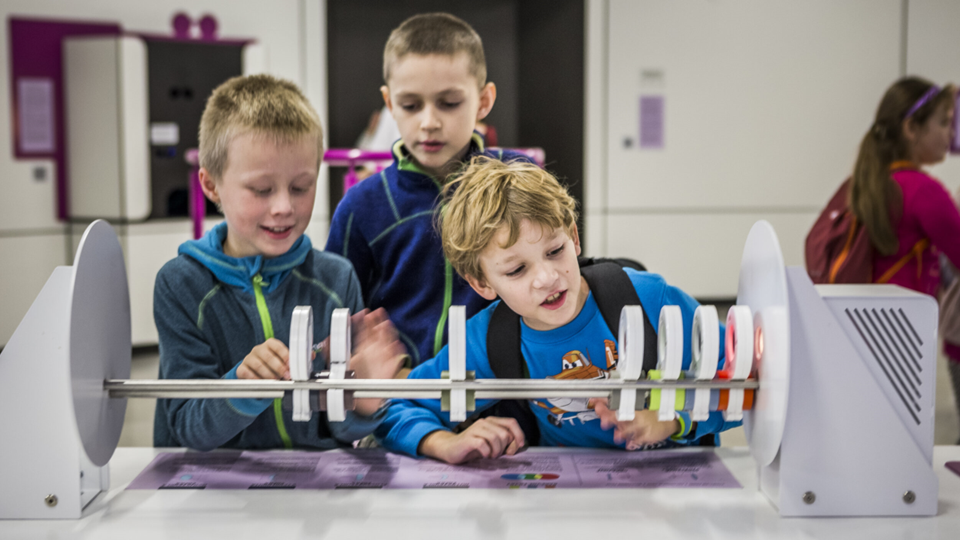A comprehensive analysis identified 47 best practices and tools developed by the MECOG-CE metropolitan partners. The study evaluated these practices according to their thematic domains, ability to address contemporary challenges, and potential for transferability to other metropolitan areas. The goal is to boost metropolitan cooperation and foster a culture of sharing and continuous learning.
Main thematic domains of the identified best tools and practices with regard to challenges and opportunities specific for Central European metropolitan areas (MAs)
The analysis identified 14 key thematic domains. The most prevalent thematic areas addressed by the practices are Transport/Mobility, Education, Regional Development, and Management of metropolitan areas. Examples of best practices in transport/mobility areas represent the Stuttgart Region’s ticket zone simplification or the Brno MA’s strategic mobility approach. The educational best practices involve for example enhancing quality of education in primary and secondary schools in the Ostrava MA or the “School closer to science” project in the Warsaw MA. The regional development and management of MAs best practices are exemplified by the Brno MA’s Questionnaire among mayors, the Turin MA’s Metropolitan strategic plan or the Berlin-Brandenburg MA’s Municipal Neighbourhood Forum.

The thematic categories are not entirely mutually exclusive, as some practices have a cross-cutting character. Examples include the Prototyping Academies (GZM Metropolis) and the Overall Strategic Framework (Capital Region Berlin-Brandenburg), which encompass various elements of sustainable regional development. These practices can be classified into multiple categories due to their complex and multidimensional nature.
The identified best practices and tools are categorized based on their effectiveness in addressing the thematic and procedural challenges faced by metropolitan areas in Central Europe identified in the previous study. The practices address thematic challenges falling under three fundamental pillars of sustainable development – environmental, social and economic. They are primarily related to broadly perceived environmental issues, such as the sustainable mobility, climate change, and promoting green transition (14 practices out of 47). Challenges such as economic growth (5), social inequality (9), and cultural diversity (3) were addressed by fewer practices. A significant group of 27 practices addressed organizational and procedural challenges related to the management and institutionalization of metropolitan areas. These practices are seen as a positive response to the need for developing and enhancing metropolitan cooperation, which is considered crucial by all Central European metropolitan areas involved in the MECOG-CE project.
Present-future orientation of best tools and practices
The analysis of best practices identified 16 future-oriented and 21 present-oriented practices out of 47. Future-oriented practices focus on anticipating future challenges and preparing for sustainable development in areas like education, territorial marketing, transport, and regional development. Present-oriented practices address the repairment of or compensation for current challenges such as enhancing human capital (e.g. Welcome Center for attracting qualified migrants, Stuttgart Region) and improving public transport (modernization of the vehicle fleet, Ostrava MA). 10 practices, defined as “in-between,” solve present challenges with reference to the future, like sustainable transport solutions and educational projects as well as planning instruments and development strategies. Typical practices of this nature are the Sustainable Urban Mobility Plan (SUMP/PUMS) in the Metropolitan City of Turin, the Closer to the labour market – Integrated Educational and Vocational Advisory System ITI WFA in the Warsaw MA, or the Overall strategic framework for the Berlin-Brandenburg Capital Region.
Potential for transferability of best tools and practices
The potential for transferability depends on the scale of a project and feasibility considerations, including available resources, and readiness for adaptation to the context’s institutional framework and policies of the receiver. Additionally, evaluating the MA’s own needs and objectives, active stakeholder engagement and detailed work planning are crucial for successful implementation.
Transferring tools and good practices from highly institutionalised metropolitan areas in Germany and Italy to Polish or Czech metropolises may be challenging, but not excluded. However, the financial and technical capabilities, as well as effective metropolitan decision making, necessary for implementing the solutions must be taken into account. Transferring tools and good practices from Polish and Czech metropolitan areas to Italian and German ones may be easier. The solutions and tools from the former are often more flexible, agile, and less technically and financially demanding. Still, their transfer is conditioned by the added value they would provide to existing metropolitan cooperation.
In general, small-scale projects focused on education, competence-building, and strategy design demonstrate high transferability. Similarly, tools addressing the cultural aspects of metropolitan development can be easily adapted to other contexts.
Project and Process Oriented Approaches
The analysis of the process- and project-oriented dimensions revealed that more half (28 out of 47) of the identified tools and best practices were project-based. Among such practices, educational initiatives and transport projects were the most common, with 14 practices. The potential for transferability of these practices was estimated by the partners as high (23 out of 28 cases).
Conversely, process-oriented practices were less frequent (19 of 47), yet partners evaluated their transferability potential as high in 15 cases. These practices, mainly indicated by more advanced metropolitan cooperation areas, focus on regional development and metropolitan area management. The potential transfer of such practices often relates to methodology or conceptual frameworks rather than specific solutions. Overall, while there’s enthusiasm for sharing best practices, a more critical assessment of transferability potential is needed, focusing on strengthening metropolitan cooperation and governance across various sectors.
In summary, the findings of the MECOG-CE project are a significant advancement in enhancing metropolitan cooperation and governance. The variety of tools and practices identified not only provide valuable resources for the ongoing development of metropolitan areas and regions but also serve as inspiration for future metropolitan planning and development strategies in Central Europe and beyond.
Accessible resources and further information
For those interested in learning the specifics of these tools and practices, the analysis titled “Report on metropolitan governance systems and existing tools/best practices at partners’ metropolitan areas (MAs) for enhancing metropolitan cooperation“ is available on the project’s website. The executive summary of the governance systems and best practices in each metropolitan area can be found on the project’s website and under the QR code below this article. Additionally, a storymap featuring the 17 selected best practices for further examination provides an interactive way to explore successful examples of metropolitan cooperation and governance.
The documents were elaborated within the project MECOG-CE: Strengthening metropolitan cooperation and governance in Central Europe and is part of the WP1: Analysis of metropolitan dimension, Activity 1.2. Analysis of existing tools/best practices for enhancing metropolitan cooperation.
Authors: Robert Pyka, Krzysztof Bierwiaczonek, Zuzanna Neuve-Église, Małgorzata Suchacka,
University of Silesia in Katowice, Faculty of Social Sciences,
Institute of Sociology, Observatory on Urban and Metropolitan Processes

